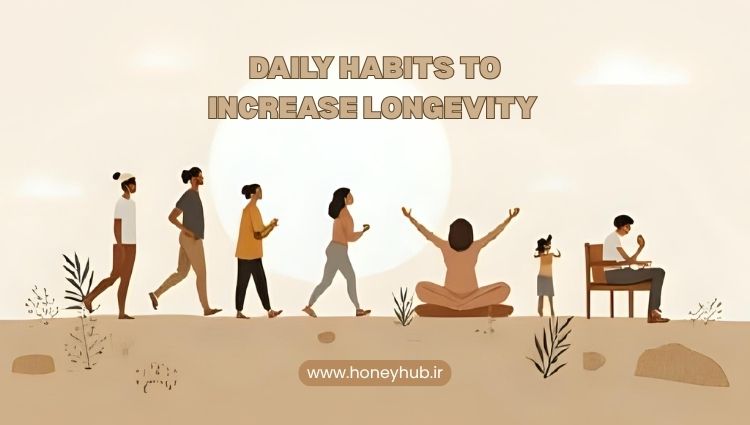Does your mozzarella refuse to stretch or just burn? The secret is science. From "pasta filata" to the crucial role...
10 Daily Habits for Longer and Healthier Life | Science-Backed Guide
10 Daily Habits for Increased Longevity and Healthier Living
We all desire a longer and healthier life. Scientific research shows that by adopting some simple daily habits, we can significantly improve our quality and length of life. This article introduces you to 10 effective habits.

1. Movement: The Body's Biological Need
The human body evolved for constant movement. Studies show prolonged sitting can have detrimental effects on metabolism. Regular physical activity:
- Improves blood circulation and increases oxygen delivery to cells
- Stimulates beneficial hormone secretion like endorphins
- Enhances lymphatic system function
- Prevents muscle tissue degeneration
Research shows people who walk 30 minutes daily live on average 3.5 years longer than sedentary individuals.
2. Sleep: A Cultural Heritage
In many traditional cultures, sleep is considered a sacred blessing. In Persian culture, the qailulah (short afternoon nap) has long been valued. Sleep quality affects:
- Directly impacts tissue repair
- Enhances memory and learning
- Regulates hormonal balance
- Strengthens the immune system
3. Nutrition: Respect for Divine Blessings
Healthy nutrition benefits not just the body but also shows respect for divine gifts and gratitude. Many religions and cultures discourage overeating and waste. Principles of healthy eating:
- Moderate and diverse consumption of divine blessings
- Avoiding excess and waste
- Focusing on food quality over quantity
- Appreciating healthy food
4. Peace: Lessons from History
Throughout history, different civilizations developed unique stress management techniques. From Buddhist meditation to Christian and Islamic prayers, all emphasized inner peace. Stress reduction methods:
- Breathing exercises (like pranayama in yoga)
- Meditation and prayer
- Engaging in artistic activities
- Spending time in nature
5. Social Relationships: An Innate Human Need
Humans evolved as social creatures. Research shows isolation can have health effects similar to smoking 15 cigarettes daily. Maintaining social relationships:
- Reduces cortisol (stress hormone) levels
- Increases oxytocin (love and trust hormone) secretion
- Lowers dementia risk
- Strengthens the immune system
People with strong social relationships are 50% more likely to reach old age than isolated individuals.
6. Avoiding Harmful Habits: Responsibility to Oneself
Caring for the body as a divine trust is everyone's responsibility to themselves and society. Quitting harmful habits benefits both individuals and those around them. Harmful habits include:
- Drug and tobacco use
- Overeating and unhealthy nutrition
- Inactivity and laziness
- Chronic stress and anger
7. Prevention: Investing in the Future
Regular medical check-ups are like periodic vehicle inspections that prevent bigger problems. Many diseases are completely treatable in early stages. Essential screenings include:
- Blood pressure and cholesterol monitoring
- Periodic blood tests
- Cancer screenings
- Dental examinations
Early cancer detection can increase treatment success rates by up to 90%.
8. Learning: A High Human Value
Many cultures recommend lifelong learning. In Islamic-Persian culture, "Seek knowledge from the cradle to the grave" shows the importance of continuous learning. Benefits of mental exercises:
- Creates new neural pathways in the brain
- Delays neurological diseases
- Increases cognitive flexibility
- Strengthens memory and concentration
9. Sunlight: Source of Life
Sunlight is essential not just for vitamin D production but also affects circadian rhythm and mood. Moderate sun exposure:
- Increases serotonin (happiness hormone) secretion
- Helps regulate sleep cycles
- Lowers blood pressure
- Strengthens the immune system
15-30 minutes of daily sun exposure (depending on skin type) is sufficient for adequate vitamin D production.
10. Purpose: The Meaning of Life
Having life purpose gives motivation and hope. All cultures and religions emphasize purposeful living. Benefits of purposeful life:
- Creates motivation for progress
- Strengthens morale and life expectancy
- Reduces stress and anxiety
- Increases life satisfaction
Conclusion
As we've seen, healthy daily habits are rooted in science, culture, history, and human values. From modern scientific recommendations to ancient wisdom, all emphasize the importance of these habits.
By incorporating these simple habits into your daily routine, you can not only add years to your life but also enjoy each day more. Start today!

Leave a comment
Log in to post comments
Related posts
 Honey Hub, a treasure trove of nature's amazing products
Honey Hub, a treasure trove of nature's amazing products Why does pollen improve your health?
Why does pollen improve your health?


















Latest comments